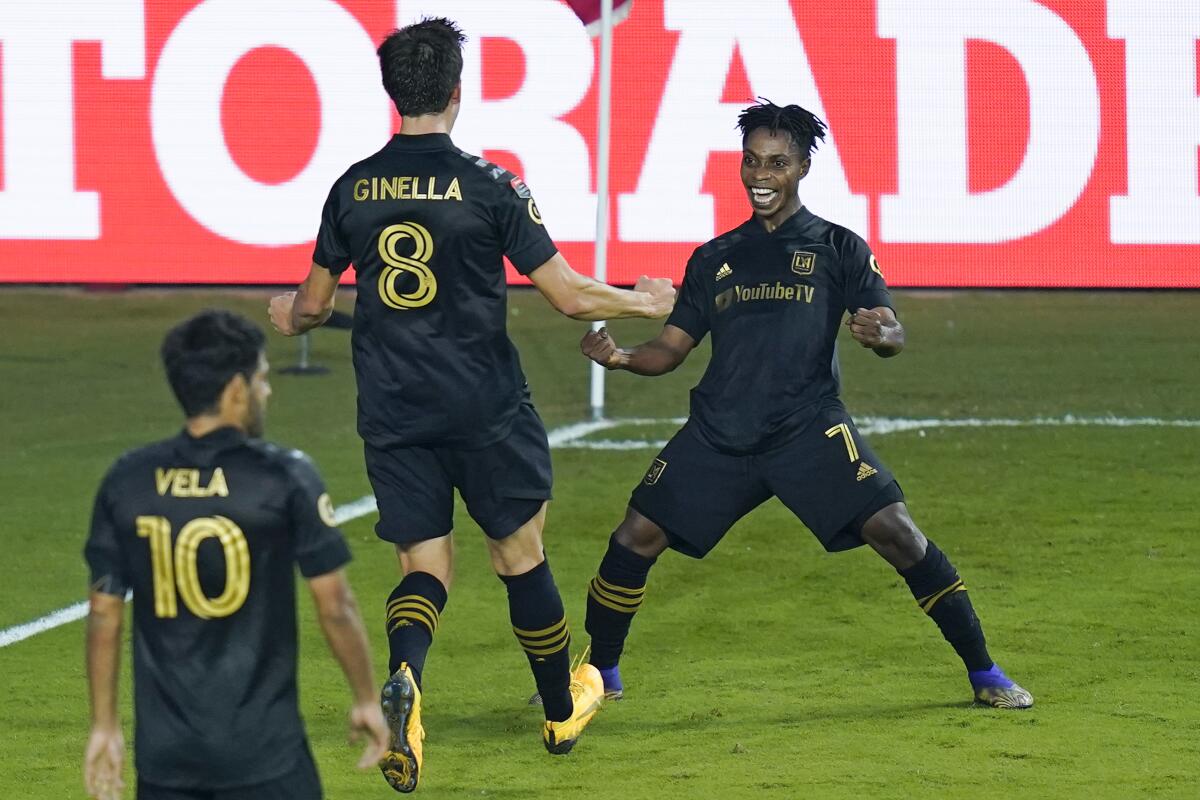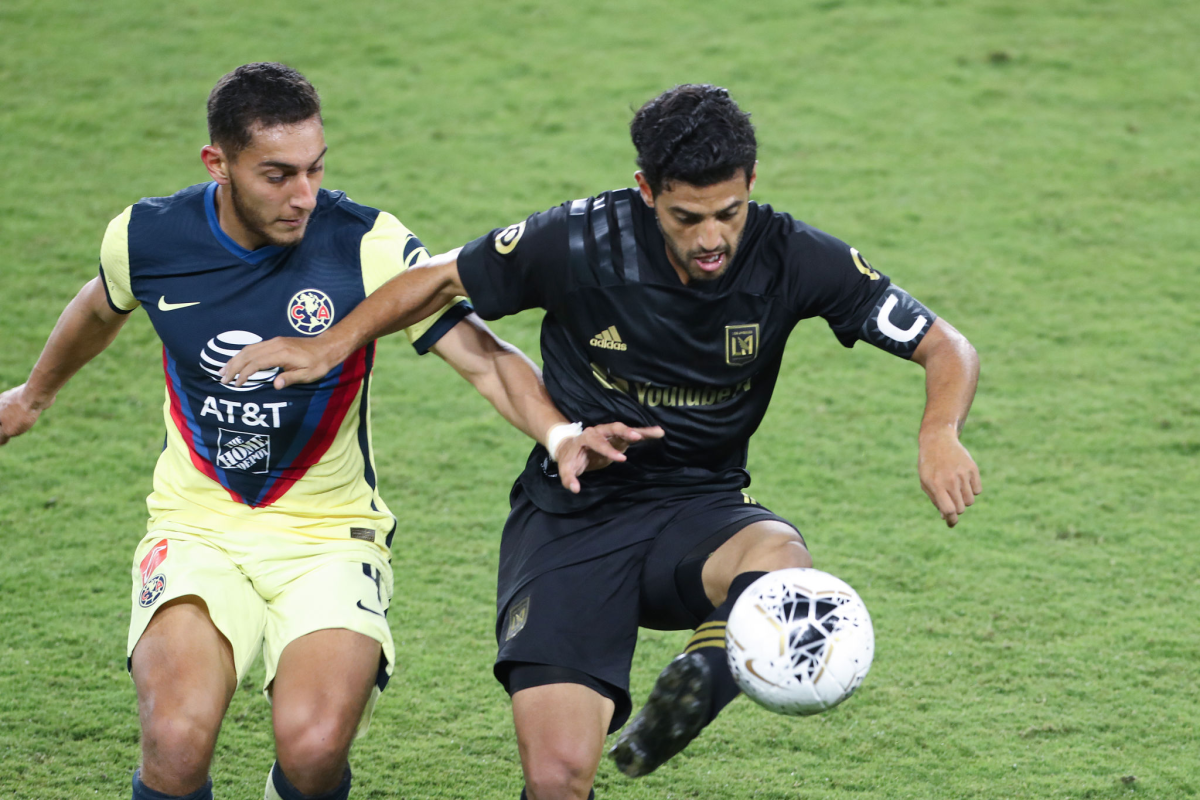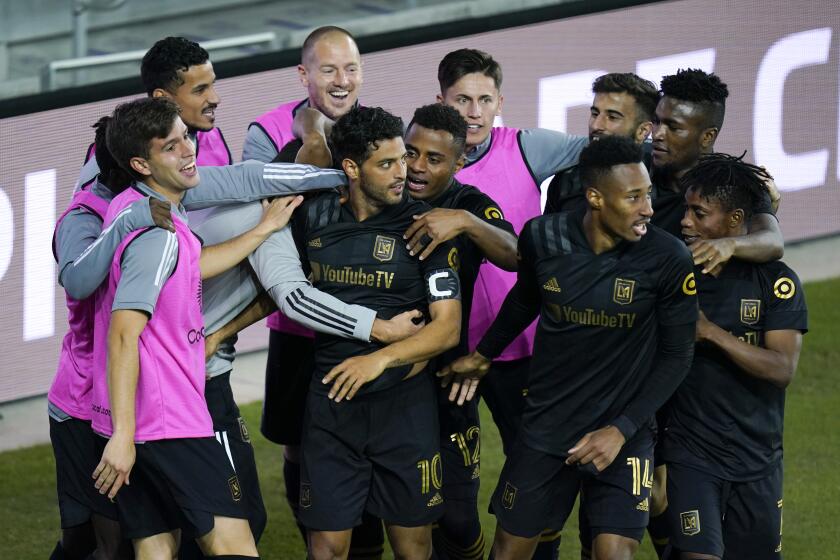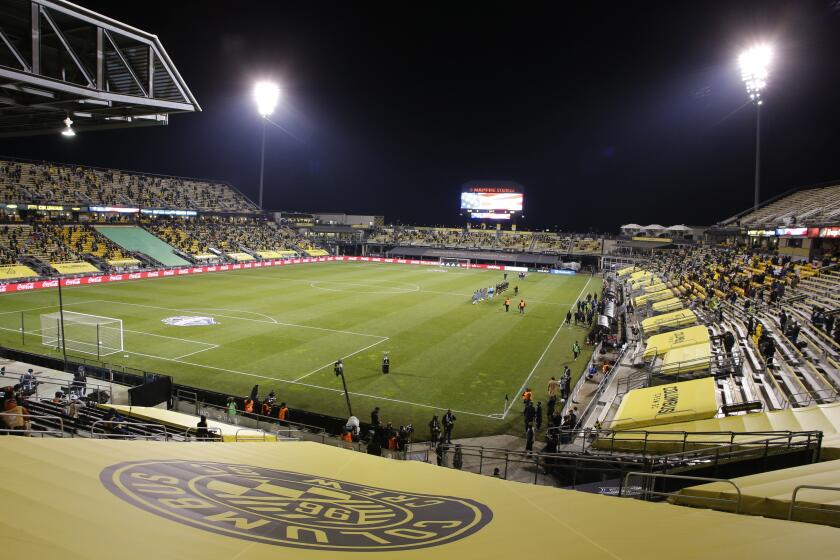Column: LAFC can prove it’s truly a different kind of MLS team with CONCACAF triumph

- Share via
At its inception, before a single player was under contract, LAFC promised to be different than any other team in Major League Soccer.
With a mission statement that read like a scam, sounded like a scam and smelled like a scam, the team invited a healthy degree of skepticism.
Starting here.
In the summer of 2017, responding to news that LAFC had received more than 17,000 season-ticket deposits for its inaugural season the following year, I wrote, “The blank roster was part of the magic, as there weren’t any names to remind potential customers of how the team would be an MLS team bound by MLS rules that would almost certainly play like an MLS team.”
Well, you can’t be right all the time.
In an empty stadium in Orlando, Fla., on Tuesday night, LAFC will take on Mexican power Tigres in the final of the CONCACAF Champions League.
LAFC has the chance to become the first MLS team to be crowned the champion of North America, Central America and the Caribbean under the competition’s current format. (Before the tournament’s expansion in 2008, two MLS teams were crowned champion, including the Galaxy in 2000.)
LAFC will be playing in a championship for the first time after defeating Club América 3-1 in the CONCACAF Champions League semifinals.
Coach Bob Bradley’s team is already the first MLS team to take down three Mexican teams in a single edition of the tournament. Tigres would be the fourth.
These Mexican teams are taking the competition seriously, evidenced by how Club América fired its coach after a loss to LAFC in the semifinals. There has been noticeable concern in the voices of the country’s sports talk-show hosts when discussing what an LAFC victory over Tigres would signify about where MLS stands relative to Liga MX. Over the last three years, MLS teams are 13-15-2 against Mexican teams in the Champions League.
“That’s a moment. That’s an opportunity,” Bradley said by phone. “These are things that define your club.”
What this moment signifies remains uncertain, but it’s undeniably a moment. Collect enough of them and they become part of a team’s cultural foundation.
Except in LAFC’s case, winning is only part of what Bradley wants to build. How the team plays is equally, if not more, important.

By controlling the ball. By sending players forward. By taking chances.
In a sport in which victories often come at the expense of style, a special reverence is reserved for teams that win while attacking.
Which is what made the night of Feb. 27 this year particularly memorable. Nine days earlier, LAFC opened Champions League play with a 2-0 loss to Leon of Mexico in the away match of a two-game series decided by aggregate scoring. On this night, in front of a packed house at Banc of California Stadium, LAFC advanced to the quarterfinal round with a 3-0 victory.
There was a feeling that LAFC was on the verge of doing something special.
The team had the best North American-based player in Carlos Vela, who in turn had high-end talent around him in South American imports Diego Rossi, Eduard Atuesta and Brian Rodriguez.
LAFC had established in its first season that it could play attractively and score. A once-porous defense tightened up in 2019 as players became familiar with Bradley’s system, resulting in the team finishing with the best record in MLS and breaking a number of records.
What was missing was a victory like this, in the knockout stage of a tournament against a formidable opponent.

LAFC won only one postseason game in its first two MLS seasons, eliminated each year by defensively inclined teams. With how LAFC looked in the return leg against Leon, it was entirely conceivable that it could not only win the tournament but do so by taking the game to tradition-rich teams accustomed to possessing the ball.
Then the COVID-19 pandemic struck.
When MLS resumed after a five-month shutdown, Bradley’s vision looked as if it could be unraveling. Against the backdrop of a knee injury that cost Vela two months, a condensed schedule that included multiple games in many weeks, irregular practices, and positive novel coronavirus tests for Rossi and Rodriguez, LAFC finished seventh in the Western Conference and was eliminated in the first round of the playoffs.
The Champions League, which was originally scheduled to end in May, offered Bradley’s team a chance to make something of the lost season. Instead of each consisting of a home-and-home series, the last three rounds were condensed to a weeklong, single-elimination tournament in Orlando.
A look back of the strangest year in MLS history, which included a shortened season, a bubble, coronavirus outbreaks and social movements.
Against Club América in the semifinals, Bradley’s team came back from a goal down with only 10 men, as midfield linchpin Atuesta was ejected for a phantom head-butt on Club América actor-goalkeeper Guillermo Ochoa. (Atuesta will be suspended for the final.) Vela scored twice in a two-minute span and assisted on a late insurance goal.
It was proof to Bradley of LAFC’s evolution, its fortified mental resilience, its expanding adaptability, its increased ability to win under the most difficult of circumstances.
“All the best teams went through this,” Bradley said. “This is how you get to the next level.”
And a trophy can further elevate a team, serving as a tangible embodiment of its ethos and permanent reminder of its expectations. Regardless of whether a victory over Tigres makes up for what was lost to the pandemic, it will at minimum return to LAFC on the path to becoming the club Bradley envisioned.









